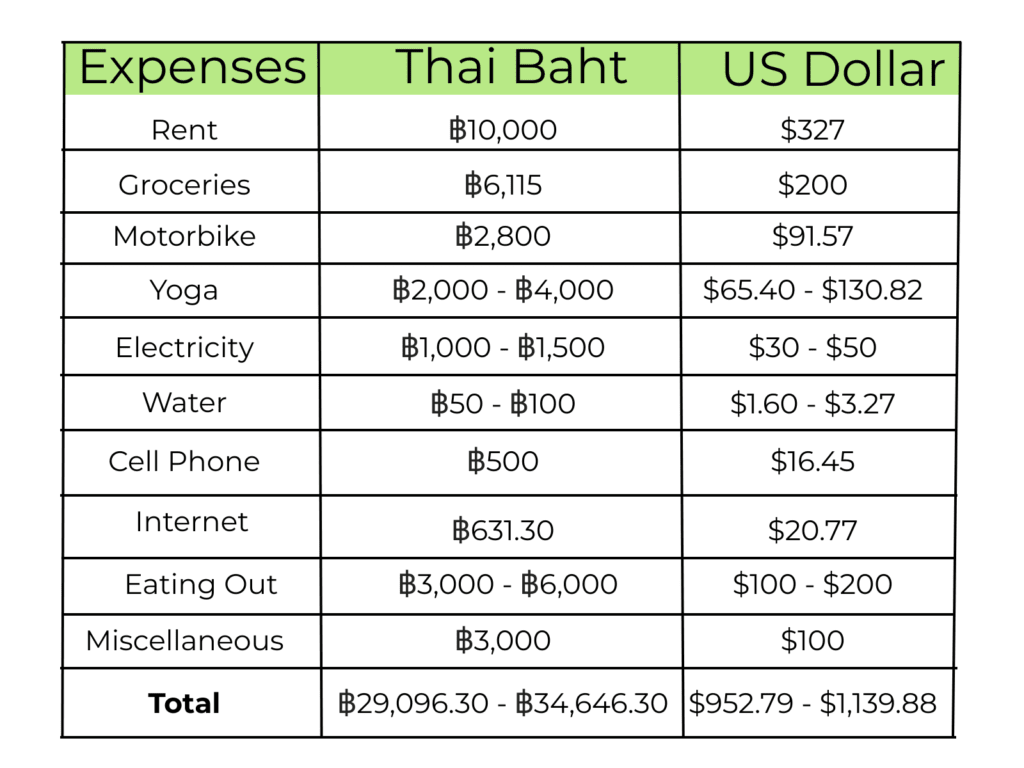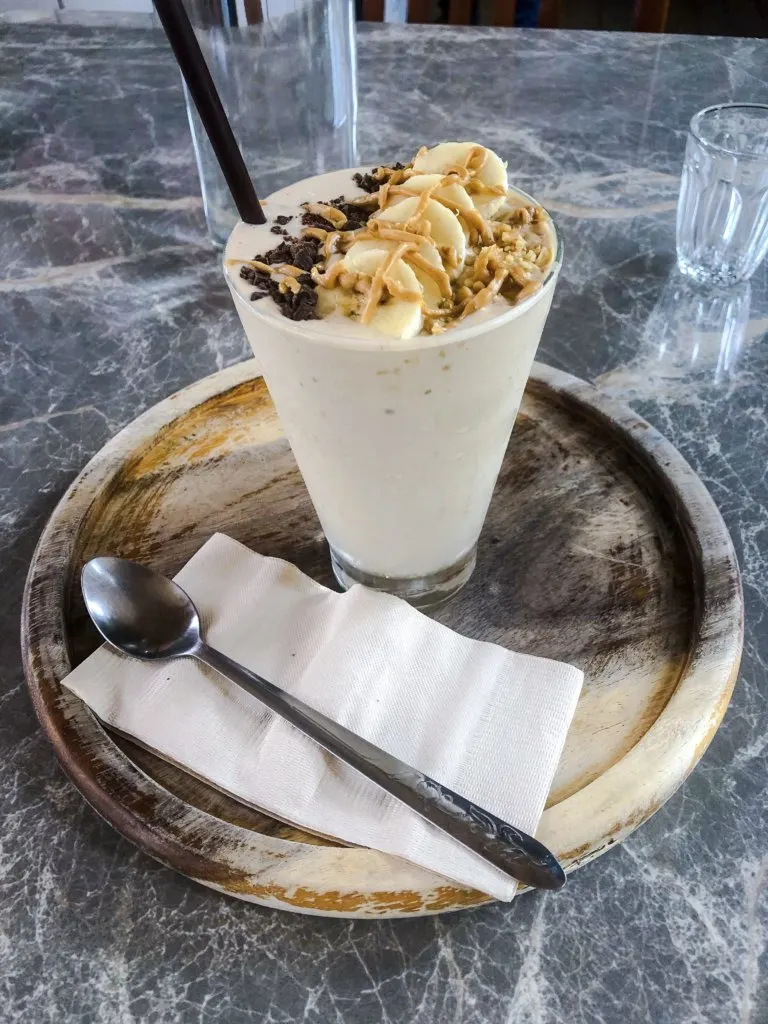Affiliate Disclosure: This post may contain some affiliate links, which means when you click, I get a small percentage of the purchase at no extra cost to you. This allows me to keep this website running, so feel free to click away! You can read my entire Affiliate Disclosure here.
Are you interested in moving to Thailand? Continue reading to see the breakdown of costs of living in Chiang Mai, Thailand!
I lived in Chiang Mai, Thailand for 16 months. There is one thing that I can tell you for sure: there is no “set-cost” of living in Chiang Mai. Like with almost every city in the world, the amount that you spend will largely depend on the quality of life that you want to live.
Some people may see how much I spend and think that I am crazy and they can live off of so much less. Yes, you can live off of less in Chiang Mai. I did like to live in a nicer apartment and take a few yoga classes per week. Everyone has a different standard of living that they want to maintain. I would rather give you advice that leaves you overestimating your costs than underestimating and running out of money.
Note: I lived alone. If you live with someone else then your costs will go down per person for many costs like rent, motorbike, electricity, water, and internet.
Table of Contents
Breakdown of Costs (per month)

Rent
I rented a studio apartment at Supalai Monte @ Viang Chiang Mai. This apartment building was very modern and westernized. It included a swimming pool, gym, roof garden, and 24-hour security. It was also in a touristy part of Chiang Mai near a very popular mall called Central Festival, and only about a 10-minute drive from Old City and Nimman.
You can rent a cheaper apartment in Chiang Mai. An important thing to remember if you do rent a cheaper apartment is that the cheaper you go, the less westernized it will be. Some people may desire to live a more “Thai way of life” when moving to Chiang Mai. I enjoyed having a more westernized apartment because so much of living in Chiang Mai is so foreign that it was nice to come home to a place that felt more normal.
Groceries
I mentioned this in my 5 Things I Hate About Thailand post, but I will reiterate it again here. An important thing to know before moving to Thailand is that groceries are expensive! I made a grocery haul YouTube video where I show the groceries that I purchased for the week, and tell you how much they cost.
It is much cheaper to eat out than to purchase all of your food from the grocery store. Also, most apartments do not have a standard kitchen if you are coming from a westernized country like the United States. The kitchen in my apartment came with cupboards, a sink, a microwave, a kettle, and a refrigerator. That’s it. I did purchase an electric single burner (which I hated, by the way), a very small toaster oven, and a rice cooker. My options for cooking were very limited.
The video above is a good example of what I would purchase on a weekly basis at the grocery store. The one thing that is not normal in that video is all of the food that I purchased from Chiang Mai Bread. That was more of a special treat that I would purchase every other month or so.
Motorbike

Before moving to Thailand, I never thought that I would ride a motorbike. I thought that people who did were so stupid. Then I moved to Thailand, where motorbikes are everywhere. I lived in Thailand for four months without riding a motorbike. There are several transportation options like tuk-tuks, songthaews, and Grab (Uber for Asia). These options become inconvenient when you are living in Thailand and relying on them everywhere you need to go.
After 4 months of living in Chiang Mai, I decided to put my fears aside and rent a motorbike. There are so many motorbike companies that you can rent from and all of them have similar prices. The price of a monthly rental tends to fluctuate throughout the year depending on if it is the high season or low season for tourists, but not by much. As I said, there are so many companies that you can rent from. I rented from a company called Bamboo Bikes for a few months. I had problems with several of their motorbikes. They also had horrible customer service. I 100% do not recommend them. After I left Bamboo Bikes, I rented from Mango Bikes for 9 months. I never had any issues with any of their bikes.
Yoga

I debated whether or not to add yoga to my list since I know a lot of people don’t practice yoga or don’t practice nearly as much as I do. I decided to add it to the list since I was giving you my monthly expenses, and yoga is a decent chunk of it. There are many yoga studios in Chiang Mai, but I always practiced at Freedom Yoga. A single class costs 250 baht ($8), a five-class pass costs 1100 baht ($36), and a ten-class pass costs 2000 baht ($65). The amount that I spent on yoga fluctuated from month to month, depending on how many yoga classes I took.
Electricity
This is no secret, but Thailand is hot! Air conditioning also isn’t cheap. I bought a few fans that I placed various places around my apartment to cut down on the amount that I had to use my air conditioner.
My electricity bill shot up significantly when I quit my job teaching English in a school and started only teaching online. When I was working at my school, there was a good 8 hours each day that I was out of my apartment and the air conditioner was tu
Water
I feel like I don’t need to say much about this. Water is cheap in Thailand. I’m not sure why some months it was 50 baht and other months it was 100 baht, but it is cheap either way.
Note: You cannot drink the tap water in Thailand. This water bill comes from the water that I used taking showers and washing dishes.
Cell Phone
I purchased a SIM card with unlimited internet for 500 baht from True. I think there was a set number of text messages, but I used WhatsApp anyway, so this wasn’t an issue for me. Calling was not included in the phone bill. I rarely ever had to make phone calls in Thailand, so this also wasn’t an issue. When I did have to make a few phone calls, True would just add the cost of those calls to my phone bill and it was still very cheap.
Internet
Most apartment buildings do not come with
Eating Out

This is an expense that will vary drastically from person to person. As I mentioned when talking about groceries, it is generally cheaper to eat out than it is to cook at home. That is if you are eating at the local Thai restaurants. There are a decent number of westernized restaurants in Chiang Mai that can be on the pricier side. I tried to avoid these restaurants as much as possible to
Are you a vegan? Click here to read my ultimate guide to eating vegan in Chiang Mai, Thailand.
Miscellaneous
My expense for miscellaneous items is 100% a guess. Cash is king in Thailand, so there isn’t really a way for me to go back and track any sort of random items that I purchased throughout my time there.
Extra Expenses
There are a few things that did not make it on my list that should also be mentioned.
Alcohol
I did not include the cost of alcohol in miscellaneous. This is because I did not drink any alcohol in Thailand for one year. I lived in Thailand for 16 months. In the first 4 months, I did drink alcohol, and then I got alcohol poisoning in September 2018. It was one of the worst experiences of my life, and I have been turned off from alcohol ever since. I did drink a little bit of alcohol when I was traveling around Vietnam and Australia.
I will try to give a rough estimate of the cost of alcohol from what I can remember. Beer costs around 50 baht, but sometimes bars will upcharge it so it will be more. Cocktails will vary depending on where you are, but I would say 100 – 200 baht is standard. Wine is not very common in Thailand. I can remember drinking wine one time while I was in Thailand, and I think it was around 200 baht.
Visas
Visas in Thailand can be complicated, and I don’t want to take up this entire post talking about visas. They are an important thing to talk about though when considering the cost of living in Thailand.
Because I am an American, I am going to be telling this from the point of view of a US citizen. Your situation may be different if you are from another country.
Americans are given a 30-day visa exemption when they enter Thailand. You can then extend that visa for another 30 days at the immigration office. The cost of extending your visa is 1,900 baht ($62). After that 30-days ends (60 days total), you must leave the country. You can do a border run to Myanmar. The cost of round trip bus tickets is around $30 and you have to pay a 500 baht ($16) fee to cross the border. You can only do two land crossings in a calendar year though, and then you must travel by air. Then the costs of visas go way up depending on where you are going and how long you are going to be gone. Immigration officers don’t look fondly upon tourists leaving the country for only a few days and then immediately returning.
If you are planning on getting a job in Thailand where you will receive a work visa, you shouldn’t have to worry about traveling by air. Non-immigrant visas and work visas do take time, but not enough time where you should have to travel by air.
Update: I ended up getting kicked out of Thailand for visa reasons. I highly recommend watching this video if you are NOT planning on working at a school in Thailand and getting a work visa.
Blogging
Having and running a blog is NOT free. In fact, it probably costs a lot more money than most people realize. I do have several monthly expenses that come from running this blog. I decided not to add it to the list since the majority of people who move to Chiang Mai don’t have a blog.



Vegan Khao Soi Recipe - Northern Thai Curry | The Vegan Abroad
Friday 18th of December 2020
[…] spent 16 months living and teaching English (both in a school and online) in Chiang Mai, Thailand. That meant that I got […]
5 Things I Hate About Thailand | The Vegan Abroad
Saturday 13th of June 2020
[…] Cost of Living in Chiang Mai, Thailand […]
What It's REALLY Like Teaching English in Thailand
Monday 11th of May 2020
[…] Read about the cost of living in Chiang Mai, Thailand. I also taught English online in the evenings and on the weekends to make extra money for traveling. […]